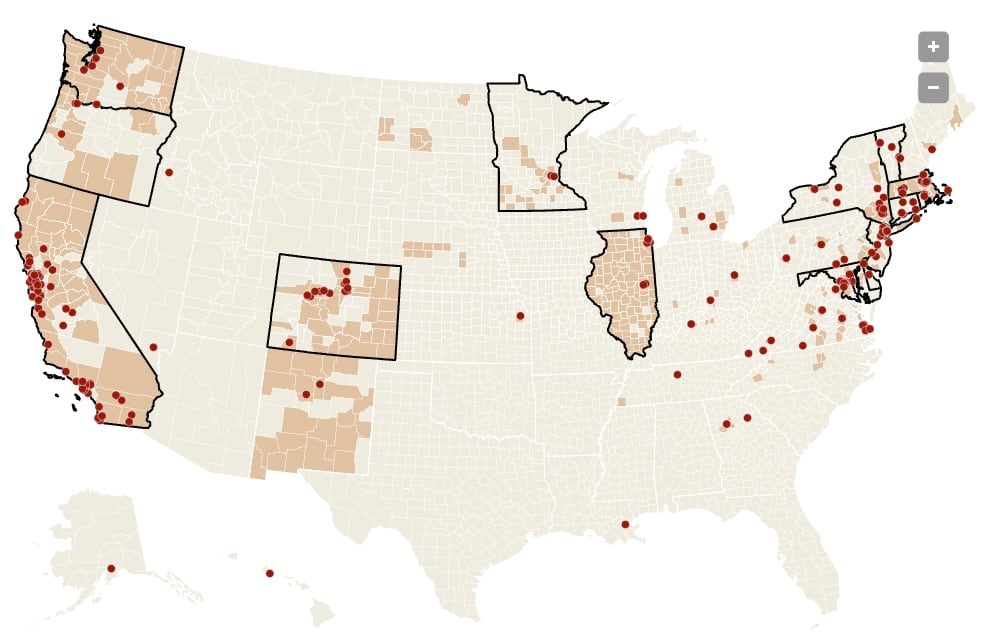The state of Oregon and 19 of its counties and cities appeared on a list of “sanctuary jurisdictions” published by the Trump administration last week before federal officials quickly
deleted
the inventory after facing blowback.
President Trump signed an
executive order
in April requiring federal officials to publish a catalogue of jurisdictions nationwide that “obstruct the enforcement” of federal immigration laws. After disclosing the list, each government was supposed to receive an official notice and a demand to revise local laws or face the threat of lawsuits and losing federal money.
But the inventory, published by federal officials last Thursday, puzzled many local leaders across the nation and got yanked offline by Sunday.
At least five jurisdictions in Oregon said they didn’t know what prompted them to be on the list, and at least one – Linn County – contacted federal officials to request its removal.
“In my 25 years as a Commissioner in Linn County, we have never passed a Proclamation, Resolution or adopted County Code declaring Linn County to be a Sanctuary County,” Roger Nyquist, chair for the county’s board of commissioners, wrote in a message sent by email on Saturday to federal officials and obtained by The Oregonian/OregonLive. “If there is some criteria that has triggered our listing, please let us know as soon as possible.”
In total, the Trump administration’s inventory included about 200 cities and counties in 37 states and identified 14 states themselves, including Oregon, as sanctuary jurisdictions. Oregon lawmakers in 1987 prohibited local law enforcement from cooperating with federal authorities for immigration enforcement, becoming the first sanctuary state in the nation.
The Department of Homeland Security boasted that its inventory was “exposing” sanctuary jurisdictions nationwide and marked a first step toward changing local rules.
“These sanctuary city politicians are endangering Americans and our law enforcement in order to protect violent criminal illegal aliens,” DHS Secretary Kristi Noem said in a news release last week. “We are exposing these sanctuary politicians who harbor criminal illegal aliens and defy federal law. President Trump and I will always put the safety of the American people first. Sanctuary politicians are on notice: comply with federal law.”
But some jurisdictions across the country were quick to question their appearance on the list. It also prompted a
strong response
from the
National Sheriff’s Association
, which said the inventory “violated the core principles of trust, cooperation, and partnership with fellow law enforcement” because it was published
without input
from sheriffs. The association usually supports immigration enforcement.
A senior DHS official wouldn’t say if the agency took down the list because of the pushback, emphasizing only that it’s being constantly reviewed and will be updated regularly.
“Designation of a sanctuary jurisdiction is based on the evaluation of numerous factors, including self-identification as a Sanctuary Jurisdiction, noncompliance with Federal law enforcement in enforcing immigration laws, restrictions on information sharing, and legal protections for illegal aliens,” the official said in an email.
In Oregon, officials in Linn, Clatsop and
Klamath
counties have contacted federal officials to challenge or seek clarity about their inclusion on the list, they said. Marion and Columbia counties said they didn’t know why their jurisdictions landed on the list.
“The term ‘sanctuary jurisdiction’ isn’t defined under state or federal law, so it’s not a term we typically apply to the County,” Mark Pacheco, a spokesperson for Columbia County, said in an email. “Columbia County has not declared itself a sanctuary jurisdiction related to immigration enforcement, and we would not describe Columbia County as a sanctuary county.”
For other jurisdictions, their names on the list didn’t come as a surprise.
Portland earlier this year
joined other local governments
in suing the Trump administration over its executive orders that would have targeted sanctuary jurisdictions by withholding millions of dollars in federal grants. A federal judge in April issued a
preliminary injunction
blocking Trump’s plan.
As of earlier this week, Portland, which declared itself a sanctuary city in 2017, hadn’t received a formal notice from DHS.
“Portland stands unwavering in its commitment to sanctuary policies, rooted in the belief that every resident, including immigrants, deserves dignity, respect, and protection,” Mayor Keith Wilson said in a statement.
Wilson added that the city “fully complies with all applicable federal and state laws” and will not interfere with “lawful federal enforcement operations.”
“Importantly, “he said, “our police officers will not be used as agents of ICE.”
Roxy Mayer, a spokesperson for Gov. Tina Kotek’s office, said the governor “will not back down from a fight and believes threats from the Trump administration undermine our values and our right to govern ourselves.”
“Oregon will not be bullied into doing the federal government’s job of performing immigration enforcement,” she said in an email.
–Yesenia Amaro is on the investigations team. Reach her at 503-221-4395, or yamaro@oregonian.com.





More Stories
Map: Every ‘sanctuary jurisdiction’ in U.S. identified by Trump’s team, and what it got wrong about Oregon
Map: Every ‘sanctuary jurisdiction’ in U.S. identified by Trump’s team, and what it got wrong about Oregon
Map: Every ‘sanctuary jurisdiction’ in U.S. identified by Trump’s team, and what it got wrong about Oregon